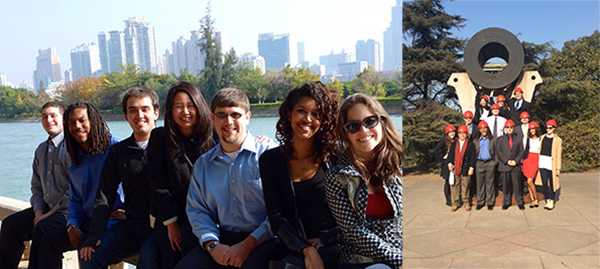
In January, Master of Management students traveled to Xiamen, China, above left, and Shanghai, above right, where they worked on a consulting project for Shanghai Baosteel Group.
Kelsey Chan-Chin graduated from Tulane University in 2014 with a bachelor’s degree in public health and a deep desire to help people eat healthier.
“I like the part of public health that involves interacting with the community, so I eventually would like to run a nonprofit,” says Chan-Chin. “But in order to do that, I realized that I would need some foundation in business.”
To get that foundation, Chan-Chin enrolled in a new program at the Freeman School designed to help non-business students gain the skills necessary to achieve their career goals or expand their career possibilities.
The Master of Management (MMG) is a one-year master’s program targeted at students with undergraduate degrees in disciplines other than business. Launched as a pilot program last year, the 36-credit-hour curriculum includes introductory courses in accounting, finance, business statistics, strategic management, leadership and ethics, marketing, operations management, and organizational behavior. Students also complete a course in international business that includes a trip to China to work on a consulting project for a Chinese manufacturing company.
“The Master of Management enables students with nonbusiness backgrounds to gain the knowledge and skills they need to launch their careers,” says Ira Solomon, dean of the Freeman School. “It opens doors to professional opportunities that otherwise would not be available.”
Graduates emerge with a broad skill set that enables them to join a variety of organizations in a variety of roles, but John Clarke, the Freeman School’s associate dean for graduate programs, says the goal of the program isn’t to replace the student’s undergraduate degree.
“The idea is to enhance what you already have and build from it,” Clarke says. “A student who graduated with a degree in biomedical engineering or neuroscience might pursue a career in the medical products or pharmaceuticals industry. Or a student who came in with a degree in chemistry might go into a materials or products company where that undergraduate degree would be an asset.”
Jonathan Ginsburgh, a member of the pilot class, majored in communications as an undergraduate with an eye towards sports marketing, but he eventually became more interested in finance and wealth management. He enrolled in the MMG program to gain the additional skills he felt he needed to get his foot in the door.
“A lot of what wealth management advisers do is marketing, so I thought my communications degree had value,” Ginsburgh says. “The MMG program was a way for me to get the business background I needed to pitch myself to potential employers.”
Following his graduation in May, Ginsburgh joined the wealth management division of Iberia Bank, a job he attributes directly to the skills he acquired in the MMG program. Ultimately, Clarke says, success stories like that that will do more to sell the program to prospective students than anything he can say.
“The program resonates with students, parents and employers,” Clarke says. “Given the success of the pilot, we are excited to officially launch the program this year.”

